The Annals Of
Page 70
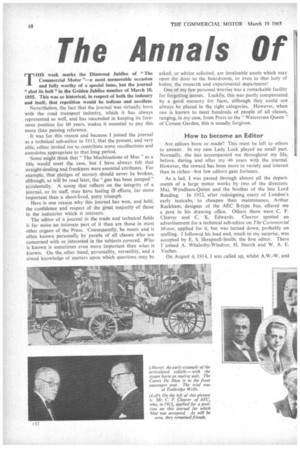
Page 71
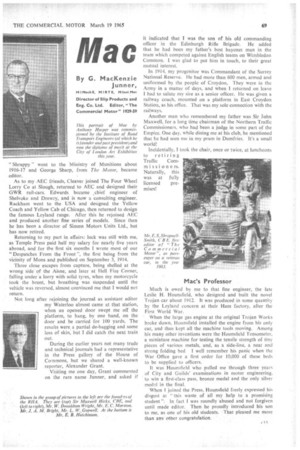
Page 72
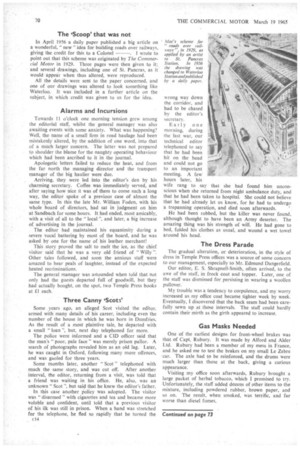
Page 75
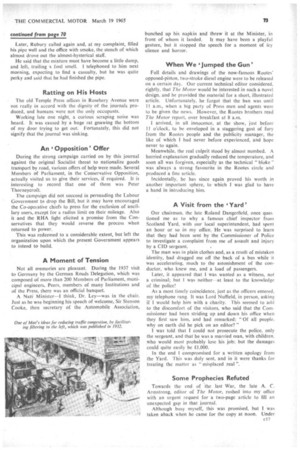
Page 76
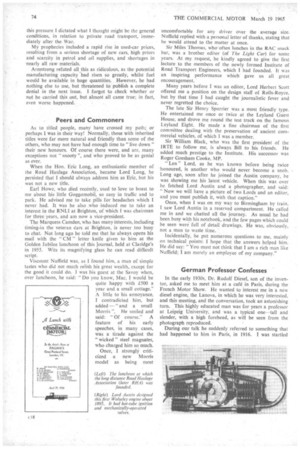
Page 77
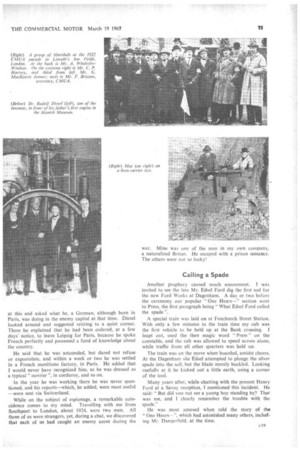
Page 78
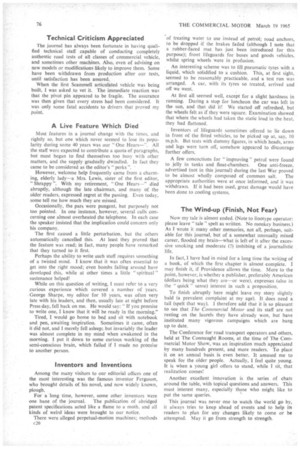
If you've noticed an error in this article please click here to report it so we can fix it.
By G. MacKenzie Junner,
M I MechE, M I RT E, Mlnst Met
THIS week marks the Diamond Jubilee of "The Commercial Motor "—a most memorable occasion and fully worthy of a special issue, but the journal "shot its bolt" in the Golden Jubilee number of March 18, 1955. This was so historical, in respect of both the industry and itself, that repetition would be tedious and needless.
Nevertheless, the fact that the journal was virtually born with the road transport industry, which it has always represented so well, and has succeeded in keeping its foremost position for 60 years, makes it essential to pay this more than passing reference.
It was for this reason and because I joined the journal as a technical sub-editor in 1913, that the present, and very able, editor invited me to contribute some recollections and anecdotes appropriate to that long period.
Some might think that "The Machinations of Mac "as a title would meet the case, but I have always felt that straight-dealing and frankness were essential attributes. For example, that pledges of secrecy should never be broken, although, as will be read later, the "gun has been jumped" accidentally. A scoop that reflects on the integrity of a journal, or its staff, may have lasting ill effects, far more important than a short-lived, petty triumph.
Here is one reason why this journal has won, and held, the confidence and respect of the great majority of those in the industries which it interests.
The editor of a journal in the trade and technical fields is far more an intimate part of it than are those in most other organs of the Press. Consequently, he meets and is often known personally by people of all classes who are concerned with or interested in the subjects covered. Who is known is sometimes even more important than what is known. On the other hand, personality, versatility, and a sound knowledge of matters upon which questions may be asked, or advice solicited, are invaluable assets which may open the door to the boardroom, or even to that holy of holies, the research and experimental department!
One of my few personal worries was a remarkable facility for forgetting names. Luckily, this was partly compensated by a good memory for faces, although they could not always be placed in the right categories. However, when one is known to meet hundreds of people of all classes, ranging, in my case, from Peers to the "Watercress Queen" of Covent Garden, this is usually forgiven.
How to become an Editor
Are editors born or made? This must be left to others to answer. In my case Lady Luck played no small part. Normally, she has accompanied me throughout my life, before, during and after my .46 years with the journal. However, the reward has been more in variety and interest than in riches—but few editors gain fortunes.
As a lad, I was passed through almost all the departments of a large motor works by two of the directors. Maj. Wyndham-Quinn and the brother of the late Lord Reading. In 1912, after redesigning many of London's early taxicabs, to cheapen their maintenance, Arthur Rackham, designer of the AEC B-type bus, offered me a post in his drawing office. Others there were C. F. Cleaver and C. K. Edwards. Cleaver spotted an advertisement for a technical sub-editor on The Commercial Motor, applied for it, but was turned down, probably on spelling. I followed his lead and, much to my surprise, was accepted by E. S. Shrapnell-Smith, the first editor. There I joined A. Whalesby-Windsor, H. Sturch and W. A. E. Vacher.
On August 4, 1914, I was called up, whilst A.W.-W. and
" Shrappy " went to the Ministry of Munitions about 1916-17 and George Sharp, from The Motor, became editor.
As to my AEC friends, Cleaver joined The Four Wheel Lorry Co at Slough, returned to AEC and designed their GWR rail-cars. Edwards became ,.‘chief engineer of Shelvoke and Drewry, and is now a consulting engineer. Rackham went to the USA and designed the Yellow Coach and Yellow Cab of Chicago, then returned to design the famous Leyland range. After this he rejoined AEC and produced another fine series of models. Since then he has been a director of Simms Motors Units Ltd., but has now retired.
Returning to my part in affairs: luck was still with me, as Temple Press paid half my salary for nearly five years abroad, and for the first six months I wrote most of our "Despatches From the Front ", the first being from the vicinity of Mons and published on September 3, 1914, Three close escapes from capture, being shelled at the wrong sideof the Aisne, and later at Hell Fire Corner, falling under a lorry with solid tyres, when my motorcycle took the brunt, but breathing was suspended until the vehicle was reversed, almost convinced me that I would not return.
Not long after rejoining the journal as assistant editor my Waterloo almost came at that station, when an opened door swept me off the platform, to hang, by one hand, on the door and be carried for 100 yards. The results were a partial de-bagging and some loss of skin, but I did catch the next train out.
During the earlier years not many trade and technical journals had a representative in the Press gallery of the House of Commons, but we shared a well-known reporter, Alexander Grant.
Visiting me one day, Grant commented on the rare name Junner, and asked if
it indicated that I was the son of his old commanding officer in the Edinburgh Rifle Brigade, He added that he had been my father's best bayonet man in the team which competed against English teams on Wimbledon Common. I was glad to put him in touch, to their great mutual interest.
In 1914, my progenitor was Commandant of the Surrey National Reserve. He had more than 600 men, armed and uniformed by the people of Croydon. They were in the Army in a matter of days, and when I returned on leave I had to salute my sire as a senior officer. He was given a railway coach, mounted on a platform in East Croydon Station, as his office. That was my sole connection with the railways.
Another man who remembered my father was Sir John Maxwell, for a long time chairman of the Northern Traffic Commissioners, who had been a judge in some part of the Empire. One day, while dining me at his club, he mentioned that be had seen me in my pram in Dumfries. It's a small world!
Incidentally, I took the chair, once or twice, at luncheons to retiring Traffic Commi ssione rs. Naturally, this was at fully
licensed premises! Mac's Professor
Much is owed by me to that fine engineer, the late Leslie H. Hounsfield, who designed and built the novel Trojan car about 1912. It was produced in some quantitr, by the Leyland concern at their Ham factory, after the First World War.
When the large gas engine at the original Trojan Works broke down, Hounsfield installed the engine from his only car, and thus kept all the machine tools moving. Among his many other inventions were the Hounsfield Tensorneter, a miniature machine for testing the tensile strength of tiny pieces of various metals, and, as a side-line, a neat and strong folding bed. I well remember his panic when the War Office gave a first order for 10,000 of these beds to be supplied to officers. • It was Hounsfield who pulled me through three years of City and Guilds' examinations in motor engineering, to win a first-class pass, bronze medal and the only silver medal in the final.
When I joined the Press, Hounsfield freely expressed his disgust at " this waste of all my help to a promising student ". In fact I was roundly abused and not forgiVen until made editor. Then he proudly introduced his son to me, as one of his old students. That pleased me more
than any other congratulation. 1 The 'Scoop' that was not
In April 1956 a daily paper published a big article on a wonderful, " new " idea for building roads over railways, giving the credit for this to a Colonel . I wrote to point out that this scheme was originated by The Commercial Motor in 1929. Three pages were then given to it; and several drawings, including one of St. Pancras, as it would appear when thus altered, were reproduced.
All the details were sent to the paper concerned, and one of our drawings was altered to look something like Waterloo. It was included in a further article on the subject, in which credit was given to us for the idea.
Alarms and Incursions
Towards 11 o'clock one morning tension grew among the editorial staff, whilst the general manager was also awaiting events with some anxiety. What was happening? Well, the name of a small firm in road haulage had been mistakenly altered, by the addition of one word, into that of a much larger concern. The latter was not prepared to shoulder the blame for the naughty operating behaviour which had been ascribed to it in the journal.
Apologetic letters failed to reduce the heat, and from the far north the managing director and the transport manager of the big haulier were due.
Arriving, they were led into the editor's den by his charming secretary. Coffee was immediately served, and after saying how nice it was of them to come such a long way, the editor spoke of a previous case of almost the same type. In this the late Mr. William Foden, with his whole board of directors, had sat in judgment on him at Sandbach for some hours. It had ended, most amicably, with a visit of all to the "local ", and later, a big increase of advertising in the journal.
The editor had maintained his equanimity during a severe vocal battering by most of the board, and he was asked by one for the name of his leather merchant!
This story proved the salt to melt the ice, as the chief visitor said that he was a very old friend of " Willy ". Other tales followed, and soon the anxious staff were amazed to hear peals of laughter, instead of the expected heated recriminations.
The general manager was astounded when told that not only had the guests departed full of goodwill, but they had actually bought, on the spot, two Temple Press books at £1 each.
Three Canny 'Scot?
Some years ago, an alleged Scot visited the editor. armed with many details of his career, including even the number of the house in which he was born in Dumfries. As the result of a most plaintive tale, he departed with a small "loan ", but, next day telephoned for more.
The police were informed and a CID officer said that the man's "poor, pale face" was merely prison pallor. A search of photographs revealed him as an old lag. Later, he was caught in Oxford, following many more offences, and was gaoled for three years.
Some months later, another " Scot " telephoned with much the same story, and was cut off. After another interval, the editor, returning from a visit, was told that a friend was waiting in his office. He, also, was an unknown "Scot ", but said that he knew the editor's father.
In this case another policy was adopted. The visitor was " disarmed " with cigarettes and tea and became more voluble and confident, until told that a previous visitor of his ilk was still in prison. When a hand was stretched for the telephone, he fled so rapidly that he turned the cI4 wrong way down the corridor, and had to be chased by the editor's secretary.
Early one morning, during the last war, our technical editor telephoned to say that he had been hit on the head and could not go to an important meeting. A few hours later, his wife rang to say that she had found him unconscious when she returned from night ambulance duty, and that he had been taken to hospital. She could not believe that he had already let us know, for he had to undergo a trepanning operation, and died soon afterwards.
He had been robbed, but the killer was never found, although thought to have been an Army deserter. The amazing thing was his strength of will. He had gone to bed, folded his clothes as usual, and wound a wet towel around his head.
The Dress Parade
The gradual alteration, or deterioration, in the style of dress in Temple Press offices was a source of some concern to our management, especially to Mr. Edmund Dangerfield.
Our editor, E. S. Shrapnell-Smith, often arrived, to the awe of the staff, in frock coat and topper. Later, one of the staff was dismissed for persisting in wearing a woollen pullover.
My trouble was a tendency to corpulence, and my worry increased as. my office coat became tighter week by week. Eventually, I discovered that the back seam had been carefully sewn up at those intervals. The staff could hardly contain their mirth as the girth appeared to increase.
Gas Masks Needed
One of the earliest designs for front-wheel brakes was that of Capt. Rubury. It was made by Alford and Alder Ltd. Rubury had been a member of my mess in France, and he asked me to test the brakes on my small Le Zebre car. The axle had to be reinforced, and the drums were much larger than those at the back, giving a curious appearance.
Visiting my office soon afterwards. Rubury brought a large packet of herbal tobacco, which I promised to try. Unfortunately, the staff added dozens of other items to the mixture, including powdered rubber, brown paper, and so on. The result, when smoked, was terrific, and far worse than diesel fumes. Later, Rubury called again and, at my complaint, filled his pipe well and the office with smoke, the stench of which almost drove out the almost-hysterical staff.
He said that the mixture must have become a little damp, and left, trailing a foul smell. I telephoned to him next morning, expecting to find a casualty, but he was quite perky and said that he had finished the pipe.
Ratting on His Hosts
The old Temple Press offices in Rosebery Avenue were not really in accord with the dignity of the journals produced, and humans were not the only occupants.
Working late one night, a curious scraping noise was heard. It was caused by a huge rat gnawing the bottom of my door trying to get out. Fortunately, this did not signify that the journal was sinking.
An 'Opposition' Offer
During the strong campaign carried on by this journal against the original Socialist threat to nationalize goods transport by road, various offers of help were made. Several Members of Parliament, in the Conservative Opposition, actually visited us to give their services, if required. It is interesting to record that one of them was Peter Thorneycroft.
The campaign did not succeed in persuading the Labour Government to drop the Bill, but it may have encouraged the Co-operative chiefs to press for the exclusion of ancillary users, except for a radius limit on their mileage. Also it and the RHA fight elicited a promise from the Conservatives that they would reverse the process when returned to power.
This was redeemed to a considerable extent, but left the organization upon which the present Government appears to intend to build.
A Moment of Tension
Not all memories are pleasant. During the 1937 visit to Germany by the German Roads Delegation, which was composed of more than 200 Members of Parliament, municipal engineers. Peers, members of many Institutions and of the Press, there was an official banquet.
A Nazi Minister—! think, Dr. Ley—was in the chair. Just as he was beginning his speech of welcome, Sir Stenson Cooke, then secretary of the Automobile Association, bunched up his napkin and threw it at the Minister, in front of whom it landed. It may have been a playful gesture, but it stopped the speech for a moment of icy silence and horror.
When We Jumped the Gun'
Full details and drawings of the now-famous Rootes' opposed-piston, two-stroke diesel engine were to be released on a certain day. Our current technical editor considered, rightly, that The Motor would be interested in such a novel design, and he provided the material for a short, illustrated article. Unfortunately, he forgot that the ban was until 11 a.m., when a big party of Press men and agents were to be given the news. However, the Rootes brothers read The Motor report, over breakfast at 8 a.m.
I arrived, in all innocence, at the show, just before 11 o'clock, to be enveloped in a staggering gust of fury from the Rootes people and the publicity manager, the like of which I had never before experienced, and hope never to again.
Meanwhile, the real culprit stood by almost numbed. A hurried explanation gradually reduced the temperature, and soon all was forgiven, especially as the technical "bloke " was always a strong favourite in the Rootes circle and produced a fine article.
Incidentally, he has since again proved his worth in another important sphere, to which I was glad to have a hand in introducing him.
A Visit from the Yard
Our chairman, the late Roland Dangerfield, once questioned me as to why a famous chief inspector from Scotland Yard, with our local superintendent, had spent an hour or so in my office, He Was surprised to learn that they had been sent by the Commissioner of Police to investigate a complaint from me of assault and injury by a CID sergeant.
The man was in plain clothes and, as a result of mistaken identity, had dragged me off the back of a bus while it was accelerating, much to the astonishment of the conductor, who knew me, and a load of passengers.
Later, it appeared that I was wanted as a witness, not a criminal; but I was neither--at least to the knowledge of the police!
As a most timely coincidence, just as the officers entered, my telephone rang. It was Lord Nuffield, in person, asking if I would help him with a charity. This seemed to add to the discomfort of the visitors, who said that the Commissioner had been striding up and down his office when they first saw him, and had remarked: "Of all people, why on earth did he pick on an editor?"
was told that I could not prosecute the police, only the sergeant, and that he was a married man, with children. who would most probably lose his job; but the damages could quite easily be £1,000.
In the end I compromised for a written apology from the Yard. This was duly sent, and in it were thanks for treating the matter as "misplaced zeal ".
Some Prophecies Refuted Towards the end of the last War, the late A. C. Armstrong, editor of The Motor, rushed into my office with an urgent request for a two-page article to fill an unexpected gap in that journal.
Although busy myself, this was promised, but I was taken aback when tie came for the copy at noon. Under c17 this pressure I dictated what I thought might be the general conditions, in relation to private road transport, immediately after the War.
My prophecies included a rapid rise in used-car prices, resulting from a serious shortage of new cars, high prices and scarcity in petrol and oil supplies, and shortages in nearly all raw materials.
Armstrong refuted all this as ridiculous, as the potential manufacturing capacity had risen so greatly, whilst fuel would be available in huge quantities. However, he had nothing else to use, but threatened to publish a complete denial in the next issue. I forgot to check whether or not he carried this out, but almost all came true; in fact, even worse happened.
Peers and Commoners
As to titled people, many have crossed my path; or perhaps I was in their way! Normally, those with inherited titles were far more natural and friendly than some of the others, who may not have had enough time to "live down" their new honours. Of course there were, and are, many exceptions not "snooty ", and who proved to be as genial as ever.
When the Hon. Eric Long, an enthusiastic member of the Road Haulage Association, became Lord Long, he persisted that I should always address him as Eric, but his was not a new title.
Earl Howe, who died recently, used to love to boast to me about his little Goggomobil, so easy in traffic and to park. He advised me to take pills for headaches which I never had. It was he also who induced me to take an interest in the RNLI at Brighton, of which I was chairman for three years, and am now a vice-president.
The Marquess Camden, who has many interests, including timing-in the veteran Cars at Brighton, is never too busy to chat. Not long ago he told me that he always opens his mail with the CM " letter knife given to him at the Golden Jubilee luncheon of this journal, held at Claridge's in 1955. Wits its magnifying glass he can read difficult script.
Viscount Nuffield was, as I found him, a man of simple tastes who did not much relish his great wealth, except for the good it could do. I was his guest at the Savoy when, over luncheon, he said: "Do you know, Mac, I would be quite happy with £500 a year and a small cottage." A little to his annoyance, I contradicted him, but added — "and a small Morris ". He smiled and said: "Of course." A feature of his early speeches, in many cases, was a tirade against the " wicked " steel magnates, who charged him so much.
„4 Lunch with
In Lk Alas Ream a
Once, I strongly criticized a new Morris model as being most uncomfortable for any driver over the average size. Nuffield replied with a personal letter of thanks, stating that he would attend to the matter at once.
Sir Miles Thomas, who often lunches in the RAC snack bar, was a brother editor (of The Light Car) for some years. At my request, he kindly agreed to give the first lecture to the members of the newly formed Institute of Road Transport Engineers, which I had founded. It was an inspiring performance which gave us all great encouragement.
Many years before I was an editor, Lord Herbert Scott offered me a position on the design staff of Rolls-Royce. but by that time I had caught the journalistic fever and never regretted the choice.
The late Sir Henry Spurrier was a most friendly type. He entertained me once or twice at the Leyland Guest House, and drove me round the test track on the famous Leyland Eight. He made a fine chairman of the first committee dealing with the preservation of ancient commercial vehicles, of which I was a member.
Sir William Black, who was the first president of the IRTE to follow me, is always Bill to his friends. He added much prestige to the Institute. His successor was Roger Gresham Cooke, MP.
" Len " Lord, as he was known before being twice honoured, is another who would never become a snob. Long ago, soon after he joined the Austin company, he was showing me his latest vehicle. When this was over he fetched Lord Austin and a photographer, and said: "Now we will have a picture of two Lords and an editor, and you must publish it, with that caption."
Once, when I was on my way to Birmingham by train, I saw Lord Austin in a reserved compartment. He called me in and we chatted all the journey. As usual he had been busy with his notebook, and the few pages which could be seen were full of detail drawings. He was, obviously, not a man to waste time.
Incidentally, he put numerous questions to me, mainly on technical points: I hope that the answers helped him. He did say: "You must not think that I am a rich man like Nuffield; I am merely an employee of my company."
German Professor Confesses
In the early 1930s, Dr. Rudolf Diesel, son of the inventor, asked me to meet him at a cafe in Paris, during the French Motor Show. He wanted to interest me in a new diesel engine, the Lanova, in which he was very interested, and this meeting, and the conversation, took an astonishing turn. This highly educated man was for years a professor at Leipzig University, and was a typical one—tall and slender, with a high forehead, as will be seen from the photograph reproduced.
During our talk he suddenly referred to something that had happened to him in Paris, in 1916. I was startled
at this and asked what he, a German, although born in Paris, was doing in the enemy capital at that time. Diesel looked around and suggested retiring to a quiet corner. There he explained that he }lad been ordered, at a few daysnotice, to leave Leipzig for Paris, because he spoke French perfectly and possessed a fund of knowledge about the country.
He said that he was astounded, but dared not refuse or expostulate, and within a week or two he was settled in a French munitions factory, in Paris. He added that I would never have recognized him, as he was dressed as a typical " ouvrier ", in corduroy, and so on.
In the year he was working there he was never questioned, and his reports—which, he added, were most useful —were sent via Switzerland.
While on the subject of espionage, a remarkable coincidence comes to my mind. Travelling with me from Southport to London, about 1924, were two men. All three of us were strangers, yet, during a chat, we discovered that each of us had caught an enemy agent during the
Calling a Spade
Another prophecy caused much amusement. I was invited to see the late Mr. Edsel Ford dig the first sod for the new Ford Works at Dagenham. A day or two before the ceremony our popular "One Hears—" section went to Press, the first paragraph being "What Edsel Ford called the spade ".
A special train was laid on at Fenchurch Street Station. With only a few minutes to the train time my cab was the first vehicle to be held up at the Bank crossing. I leapt out, used the then magic word " Press " on the constable, and the cab was allowed to speed across alone, while traffic from all other quarters was held up.
The train was on the move when boarded, amidst cheers. At the Dagenham site Edsel attempted to plunge the silver spade into the soil, hut the blade merely buckled. Looking ruefully at it he kicked out a little earth, using a corner of the tool.
Many years after, while chatting with the present Henry Ford at a Savoy reception, I mentioned this incident. He said: "But did you not see a young boy standing by? That was me, and I clearly remember the trouble with the spade."
He was most amused when told the story of the "One Hears—", which had astonished many others, including Mr. Danr4er1ield, at the time.
Technical Criticism Appreciated
The journal has always been fortunate in having qualified technical staff capable of conducting completely authentic road tests of all classes of commercial vehicle, and sometimes other machines. Also, even of advising on new models or modifications likely to improve them. Some have been withdrawn from production after our tests, until satisfaction has been assured.
When the first Scammell articulated vehicle was being built, 1 was asked to vet it. The immediate reaction was that the pivot pin appeared to be fragile. The assurance was then given that every stress had been considered. It was only some fatal accidents to drivers that proved my point.
A Live Feature Which Died
Most features in a journal change with the times, and rightly so, but one which never seemed to lose its popularity during some 40 years was our "One Hears—". All the staff were expected to contribute a quota of paragraphs, but most began to find themselves too busy with other matters, and the supply gradually dwindled. In fact they came to be considered as the editor's "perks ".
However, welcome help frequently came from a charming, elderly lady—a Mrs. Lewis, sister of the first editor, " Shrappy ". With my retirement, "One Hears—" died abruptly, although the late chairman, and many of the older readers, expressed regret at the passing. Even today, some tell me how much they are missed.
Occasionally, the pars were pungent, but purposely not too pointed. In one instance, however, several calls concerning one almost overheated the telephone. In each case the speaker insisted that the implication could concern only his company.
The first caused a little perturbation, but the others automatically cancelled this. At least they proved that the feature was read; in fact, many people have remarked that they turned to it first.
Perhaps the ability to write such stuff requires something of a twisted mind. I know that it was often essential to get into the right mood; even bombs falling around have developed this, while at other times a little "spiritual " sustenance helped!
While on this question of writing, I must refer to a very curious experience which covered a number, of years. George Sharpe, my editor for 10 years, was often very late with his leaders, and then, usually late at night before Press day, fell back on me. He would say: " If you promise to write one, I know that it will be ready in the morning."
Tired, I would go home to bed and sit with notebook and pen, awaiting inspiration. Sometimes it came, often it did not, and I merely fell asleep; but invariably the leader was almost complete in my mind when awakened in the morning. I put it down to some curious working of the semi-conscious brain, which failed if I made no promise to another person.
Inventors and Inventions
Among the many visitors to our editorial offices one of the most interesting was the famous inventor Ferguson, who brought details of his novel, and now widely known, plough.
For a long time, however, some other inventors were one bane of the journal. The publication of abridged patent specifications acted like a flame to a moth, and all kinds of weird ideas were brought to our notice.
There were alleged perpetual-motion machines: methods c20
of treating water to use instead of petrol; road anchors, to be dropped if the brakes failed (although I note that a rubber-faced mat has just been introduced for this purpose); front lifeguards for buses and goods vehicles, whilst spring wheels were in profusion.
An interesting scheme was to all pneumatic tyres with a liquid, which solidified to a cushion. This, at first sight, seemed to be reasonably practicable, and a test run was arranged. A car, with its tyres so treated, arrived and off we went.
At first all seemed well, except for a slight hardness in running. During a stop for luncheon the car was left in the sun, and that did it! We started off refreshed, but the wheels felt as if they were square. Examination showed that where the wheels had taken the static load in the heat, they had flattened.
Inventors of lifeguards sometimes offered to lie down in front of the fitted vehicles, to be picked up at, say, 10 m.p.h. But tests with dummy figures, in which heads, arms and legs were torn off, somehow appeared to discourage further offers.
A few concoctions for " improving " petrol were found to jelly in tanks and float-chambers. One anti-freeze, advertised (not in this journal) during the last War proved to be almost wholly composed of common salt. The appropriate authorities were at once informed, and it was withdrawn. If it had been used, great damage would have been done to cooling systems.
The Wind-up (Finish, Not Fear) Now my tale is almost ended. (Note to linotype operator: please leave "tale "spelt as written. No monkey business.) As I wrote it many other memories, not all, perhaps, suitable for this journal, but of a somewhat unusually mixed career, flooded my brain—what is left of it after the excessive smoking and moderate (?) imbibing of a journalistic life.
In fact, I have had in mind for a long time the writing of a book. of which the first chapter is almost complete. I may finish it, if Providence allows the time. More to the point, however, is whether a publisher, preferably American (dollars being what they are—or were), expresses (also in the "quick" sense) interest in such a proposition.
To finish abruptly here might leave my story slightly bald (a prevalent complaint at my age). It does need a tail (spelt that way). I therefore add that it is so pleasant to see that The Commercial Motor and its staff are not resting on the laurels they have already won, but have instituted many vigorous campaigns which are bang up to date.
The Conference for road transport operators and others, held at The Connaught Rooms, at the time of The Commercial Motor Show, was an inspiration much appreciated by many hundreds present, and more readers. To place it on an annual basis is even better. It amused me to speak for the older people. Actually, I feel quite young. It is when a young girl offers to stand, while I sit, that realization comes!
Another excellent innovation is the series of chats around the table, with topical questions and answers. This must interest many, especially those who might like to put the same queries.
This journal was never one to watch the world go by, it always tries to keep ahead of events and to help its readers to plan for any changes likely to come or be attempted. May it go from strength to strength.












































































































































